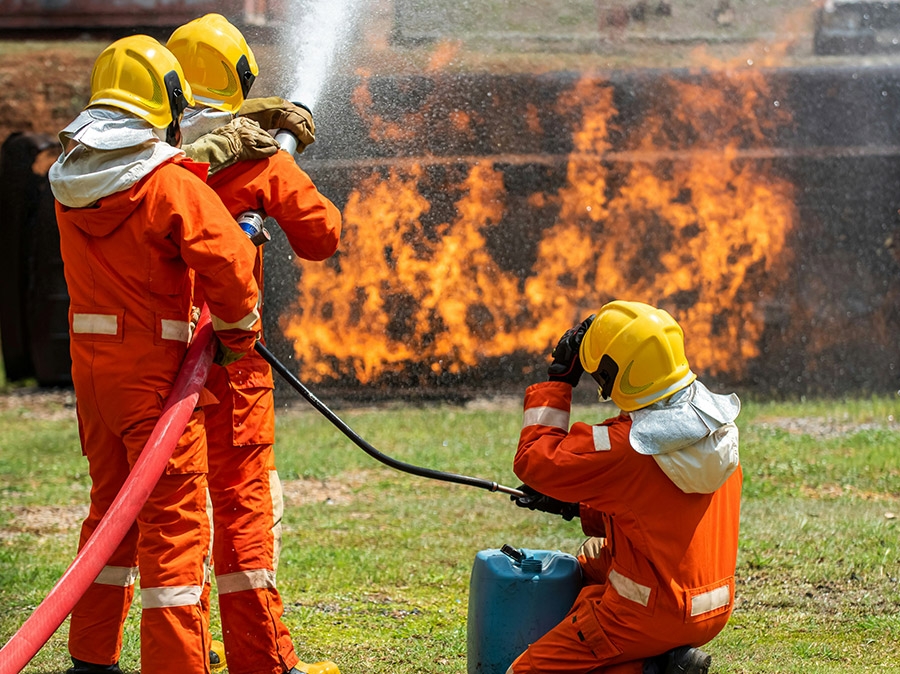Tags
HOW TO BECOME A SUPERYACHT DECKHAND
Working as a deckhand offers the opportunity to meet interesting people, earn a good salary and travel to stunning destinations. However, becoming a superyacht deckhand requires preparation, a strong work ethic, and the right attitude. If you're considering this exciting career path, this guide will walk you through how to become a deckhand and what the role involves.
What is a superyacht deckhand?
A superyacht deckhand is a key crew member responsible for the maintenance and operation of the yacht’s exterior. As the first point of contact for guests when they board, deckhands play an essential role in maintaining the luxury standards of the vessel. This entry-level position is physically demanding and requires long hours, but it offers incredible opportunities for travel, adventure, and career growth within the superyacht industry.

Key responsibilities of a superyacht deckhand.
Deckhands have various responsibilities that revolve around maintaining the vessel's exterior, assisting in navigation, and ensuring safety. Some of the primary duties include:
• Exterior Cleaning and Maintenance: Deckhands ensure the yacht's exterior stays immaculate. This includes washing the deck, polishing metalwork, and cleaning windows. Attention to detail is key, as superyachts must remain spotless.
• Handling Mooring Lines: During docking and departure, deckhands are responsible for handling lines and securing the yacht.
• Operating Tenders and Water Sports Equipment: Deckhands often manage tenders (small boats used to transport guests) and help with water sports activities like jet skis, paddleboards, and diving gear.
• Safety Checks and Procedures: Ensuring the yacht adheres to safety protocols is crucial. Deckhands are trained to assist in emergency situations, perform basic maintenance on safety equipment, and know how to respond to accidents on board.
• Assisting Guests: Whether it’s helping guests on and off the yacht, setting up deck chairs, or facilitating water sports activities, deckhands ensure that guests have a luxurious and enjoyable experience.
• Watchkeeping: When the yacht is at sea, deckhands often assist in keeping watch, monitoring the yacht’s surroundings for safety, and helping with navigation.
• General Maintenance: Minor repairs and maintenance, such as painting or repairing lines, are common duties that ensure the yacht remains in top condition.
• And taking out the rubbish!
How to become a superyacht deckhand.
Now that you understand what the role entails, let’s dive into how you can land your first job as a superyacht deckhand.

1. Meet the basic requirements.
Before you start applying for jobs, ensure you meet the basic prerequisites:
Age: You to be at least 18 years old.
Passport: You’ll need a valid passport, as you’ll be travelling internationally.
Fit and Healthy: The job is physically demanding, so you need to be in good physical shape. You will also to pass a medical examination known as the ENG1, which confirms your fitness to work at sea.
2. Complete the required certifications.
To work legally as a deckhand on superyachts, you’ll need a few essential certifications. These courses will equip you with the skills to handle emergencies and understand the basics of life at sea.
STCW (Standards of Training, Certification, and Watchkeeping): This is the mandatory training required for all crew members working on yachts over 24 meters in length. It typically covers:
- Firefighting
- First aid
- Sea survival
- Personal safety and social responsibilities
- Security awareness
The STCW course is generally completed in 5-7 days and is a non-negotiable requirement for working on yachts.
ENG1 Medical Certificate: This certificate is proof that you are physically fit to work at sea. You’ll need to schedule a medical examination with an approved doctor who specializes in maritime health.
3. Gain relevant skills.
While no formal education is required to become a deckhand, certain skills and experiences can make you stand out:
• Boating Experience: Experience handling boats or operating water sports equipment will be highly beneficial. If you don’t have any boating experience, consider taking courses such as the Powerboat Level 2 certification, which teaches you how to operate small powerboats.
• Practical Skills: Basic knowledge of mechanical work, painting, or carpentry can come in handy when maintaining the yacht.
• Hospitality and Customer Service: If you’ve worked in a customer-facing role, such as in hotels, restaurants, or hospitality, your skills in dealing with guests can be a valuable asset.
4. Network and register with crew agencies.
Once you’re certified, it’s time to start job hunting. The superyacht industry relies heavily on networking, so it’s essential to get your name out there.
Crew Agencies: There are several reputable yacht crew agencies that can help place you on a vessel. Make sure you look for ones certified by the MCA like Venture Yacht Crew.
Dockwalking: A traditional way to get your foot in the door is through “dockwalking,” which involves visiting marinas and introducing yourself to crew members or yacht captains in person. You may be able to pick up daywork (temporary jobs) which can lead to full-time positions. When dockwalking, make sure to dress professionally, bring copies of your CV, and be ready to answer questions.
5. Prepare a strong CV.
We have a CV template on our website which is free and easy to use
Your yacht CV should be clear, concise, and highlight relevant skills. Here are some tips to make your CV stand out:
• Personal Information: Include your name, a headshot photo, contact information, and nationality.
• Qualifications: List your STCW, ENG1, and any other certifications.
• Relevant Experience: Mention any previous roles in boating, maintenance, or customer service.
• References: If you’ve done daywork or part-time roles, include references who can vouch for your work ethic and abilities.
6. Stay persistent and patient.
Getting your first deckhand job may take time, but persistence is key. Keep networking, applying for jobs, and gaining experience wherever possible. Seasonal work often presents more opportunities, so stay flexible and ready to move at a moment's notice.
The realities of working as a deckhand.
While the superyacht industry may seem glamorous, life as a deckhand is not without its challenges. Long hours, physical labour, and time away from family and friends are all part of the job. Additionally, the standard of work expected is extremely high, as you’re catering to wealthy and demanding guests. Here are some factors to consider:
Work-Life Balance: You’ll often work long hours and may not have much free time during guest trips. Off-seasons, however, may offer time to relax or travel.
Tight Quarters: You’ll likely be living in shared cabins with other crew members, so you need to be comfortable working in close quarters.
Seasonal Nature: Many deckhand jobs are seasonal, with more opportunities during peak yachting seasons (summer in the Mediterranean, winter in the Caribbean).
Career Progression: With time and experience, you can move up the ranks to positions like Bosun (lead deckhand) or even Officer. Continuing education and gaining more certifications (e.g., Yachtmaster) can open doors to more advanced roles.
Conclusion.
Becoming a superyacht deckhand is a fantastic way to start your career in the yachting industry. It offers an exciting lifestyle with the chance to see the world while working on some of the most luxurious vessels. If you’re hardworking, eager to learn, and passionate about the sea, a career as a deckhand could be the perfect fit. Follow the steps above to get started, and with persistence, you’ll soon be on your way to living the yachtie life.







